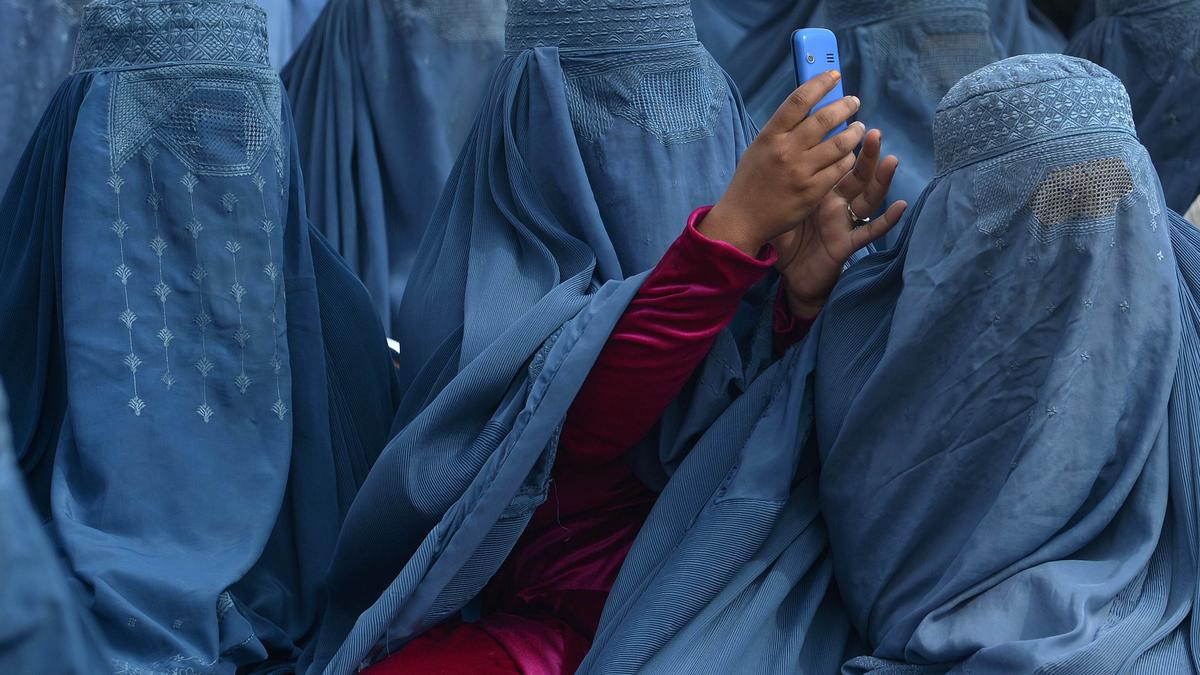Yunis Safi, a businessman from Kabul, knows well how important it is to show off your phone when you want to get something done.
Also read: Afghanistan since the takeover by the Taliban
“In Afghanistan, your phone is your personality,” he said, smiling, a jewel-encrusted ring on each hand. One shows off an emerald, the other a thick Russian diamond. “If you go to a meeting with the government, the better your phone, the more respect they have for you.” Mr. Safi runs a phone shop in the upmarket Shar-e-Naw district. There is an armed guard outside. The iPhone 15 Pro Max graces store shelves and costs $1,400. He has clients who are willing to part with this sum of money, which may come as a surprise to some given the country’s economic problems and more than half of its population relying on humanitarian aid to survive.
Also read: Timeline | The Taliban’s rapid advance through Afghanistan
Afghanistan’s finances were already on shaky ground before the Taliban seized power in 2021. The budget was heavily dependent on foreign aid and corruption was rife. The takeover sent the Afghan economy into a tailspin, billions in international funds were frozen and tens of thousands of highly qualified Afghans fled the country, taking their money with them.
But even under difficult circumstances, some companies are making money from the Taliban regime. However, women are reduced to customers as authorities have denied them most jobs, including retail. None of Mr Safi’s 78 employees are women.
He has tapped into a diverse consumer base: those hungry for the latest iPhone release and those happier with simple handsets, which make up the bulk of his sales and sell for between $20 and $200.
The Taliban attacked telephone towers and threatened telecom companies, accusing them of collaborating with the United States and other international forces in tracking insurgents’ movements through cell phone signals. Now they are investing in the 4G mobile networks.
The Ministry of Communications says two million new SIM cards have been issued in the past two years and the number of subscribers is increasing. Ministry spokesman Enayatullah Alokozai said the government is investing $100 million into the telecom sector and has fully restored hundreds of towers.
There are 22.7 million active SIM cards in a country with 41 million inhabitants. Of these, 10 million are for voice calls and the rest for mobile internet.
According to figures from the Ministry of Commerce, the import of telephones has increased. In 2022, more than 1,584 tons of telephones entered Afghanistan. Last year that was 1,895 tons.
Mr. Safi said he has many Taliban customers and it is the youth who prefer iPhones. “Of course they need smartphones. They use social media and enjoy making videos. The iPhone has better security than Samsung. The camera resolution, processor and memory are all better. Afghans use their smartphones just like anyone else.” Mr Safi has the iPhone 15 Pro Max, wears an Apple Watch Ultra and owns three cars.
Immediately after the Taliban takeover, business was bad, but the situation is improving, Mr Safi said. “The people buying the new iPhones are the ones with relatives abroad who are sending money to Afghanistan.” Remittances are a lifeline, even if they are less than half of what they were before the Taliban took power and the banking sector collapsed.
At Kabul’s raucous Shahzada market, hundreds of money changers grab stacks of the local currency, the Afghani, and noisily sell their wares. They occupy every floor, stairwell, nook and cranny.
Abdul Rahman Zirak, a senior official in the currency exchange market, estimates that $10 million changes hands every day. The diaspora mainly sends US dollars to families, who exchange them for the Afghani.
There used to be more ways to send money to Afghanistan before the Taliban took control. But there are no longer any ties to the Society for Worldwide Interbank Financial Telecommunications (SWIFT) or the international banking industry and that is a major reason why business is brisk in the market, he said.
“The work of money changers has increased and strengthened,” Mr. Zirak said. “Money transfers come from Canada, the US, Europe, Australia, Arab countries and other neighboring countries.” During the festive season, business becomes hectic. During the holy month of Ramadan, 20,000 people visited the market every day and it took more than 90 minutes to enter, he said.
“If sanctions are lifted and assets are frozen, our business may decline. But I don’t see that happening. Many do not have a bank account. Unemployment is high, so people send money to Afghanistan. Our company will be needed in the coming years.” Irfanullah Arif, director of Haqqani Books, a specialist seller of Islamic texts, is also optimistic about his fate. The majority of his customers are teachers and students from religious schools, or madrassas.
There are at least 20,000 madrassas in Afghanistan. The Taliban want to build more. Last year, the supreme leader reportedly ordered the recruitment of 1,00,000 madrassa teachers.
While Mr. Arif’s company suffered like all the others from the chaotic aftermath of the takeover, there was another reason. “All the students left the madrassas and went to work [Taliban] government,” Mr Arif said.
The Taliban’s push for religious education has given him some relief. Last year he sold 25,000 textbooks.
But there is a price to pay for success. Mr. Arif imports everything and the Taliban are focused on collecting revenue, even Islamic literature.
Mr. Arif pays a tax of 170 afghans ($2.36) on a box of 100 books, the shipping cost of which is 500 afghans ($6.95). Taxes on his bookstore have tripled under Taliban rule.
“That’s why books are expensive in Afghanistan,” he sighed. “With the increase in madrassas, our trade has increased, but so have taxes.”





















